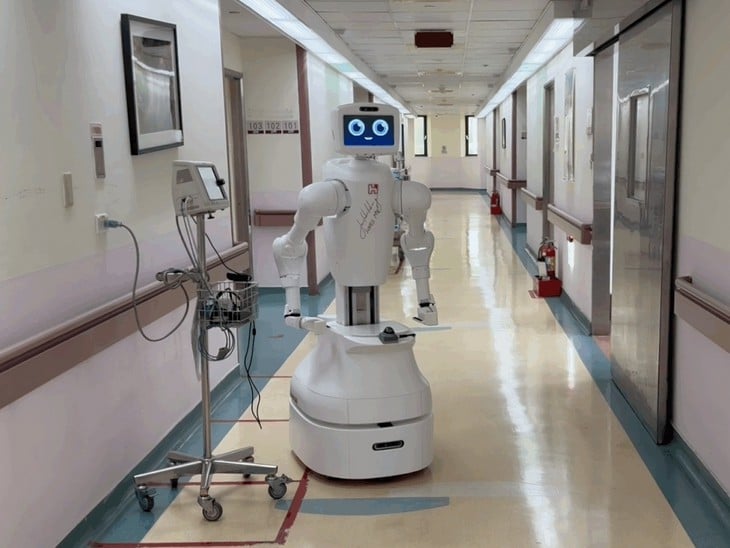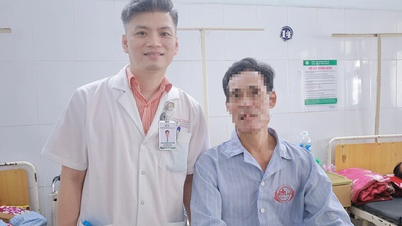
Robots assist nurses in hospitals - Photo: RYAN DAWS
Hospital automation is the application of technology systems such as artificial intelligence (AI), IoT devices, smart management software, automatic machines, etc. into the process of medical examination, treatment and operation.
From the reception desk to the laboratory, pharmacy or medical record storage system... everything is being digitized and automated, turning every hospital visit into a convenient, quick, and humane experience.
When hospitals 'know how to operate themselves'
By simply scanning the health insurance code at the automatic kiosk, patients can receive a queue number and detailed instructions on the touch screen without having to jostle at the reception counter. Personal data and medical history are recorded by the system, medical records are stored electronically, no longer worrying about loss or mistakes.
In the clinic, automatic vital signs measuring devices, ultrasound machines, and AI-integrated imaging diagnostic machines help doctors identify abnormalities more accurately.
In pharmacies, robots dispense medicine instead of humans, reducing the risk of mistakes. Even test samples and medicines are transported automatically through pipes, saving hours of travel for staff.
Why is automation the 'salvation' of modern healthcare?
Not only does automation help patients reduce stress, it also helps solve the difficult problems of hospitals: overload, cumbersome procedures, risk of infection, and lack of human resources.
In fact, many hospitals in Ho Chi Minh City have significantly reduced waiting time after applying an automatic flow system and booking appointments via the app. Bach Mai Hospital has applied a robot to transport test samples, helping to save 30% of staff travel time.
In developed countries like South Korea or Singapore, robots have replaced humans in transporting samples between departments, reducing cross-contact - a crucial factor in disease prevention.
Technology also 'frees' medical staff from tedious paperwork, allowing them to focus on the most important thing: taking care of people's health. No more manual recording, time-consuming record searching, all patient information is available, accurate, and updated in real time.
Patients' families also feel more secure when they can monitor treatment progress remotely via the application. For chronic patients such as diabetics, the insulin injection reminder system, warning when entering the wrong dose... helps reduce risks to a minimum.
A humane and modern medical examination and treatment journey
To have such an 'automated hospital', it is not only about buying machines but also about a synchronized digital infrastructure and a patient-centered vision. But when all the links are connected, the journey to the hospital will no longer be a worry, but will become a more reassuring, gentle and friendly experience than ever.
In Singapore, check-in kiosks are designed down to the last detail: support 5 languages, have illustrations, voice guidance so that even the elderly can easily use them.
Seemingly small changes like no more long waiting times, no more having to remember prescriptions, or no more worrying about lost paperwork are adding up to a quiet revolution in the medical industry.
When every step of operation is optimized by technology, hospitals will not only become smarter, but also closer and more humane to each patient. And that is coming, not in a distant future, but right in today's hospitals.
When technology is the 'silent doctor'
Automation is quietly changing the face of modern medicine from admission to treatment. When machines take over repetitive tasks, when AI helps detect abnormalities early, when electronic records replace piles of cumbersome paperwork, patients receive better care and doctors have more time to listen and treat more deeply.
Source: https://tuoitre.vn/dot-pha-trong-kham-chua-benh-nho-tu-dong-hoa-20250610095904012.htm


































































































Comment (0)